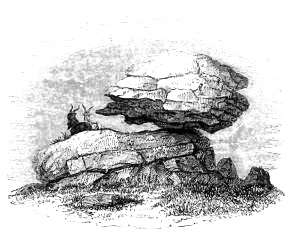Strongbow returns to England
Strongbow again committed the government of Dublin to Miles de Cogan, and set out for Wexford. On his way thither he was opposed by O'Regan, Prince of Idrone. An action ensued, which might have terminated fatally for the army, had not the Irish prince received his death-wound from an English archer. His troops took to flight, and Strongbow proceeded on his journey. But he arrived too late. Messengers met him on the way, to inform him that the fort of Carrig had fallen into the hands of the Irish, who are said to have practised an unjustifiable stratagem to obtain possession of the place. As usual, there are two versions of the story. One of these versions, which appears not improbable, is that the besieged had heard a false report of the affair in Dublin; and believing Strongbow and the English army to have been overthrown, they surrendered on the promise of being sent in safety to Dublin. On their surrender, the conditions were violated, FitzStephen was imprisoned, and some of his followers killed. The charge against the besiegers is that they invented the report as a stratagem to obtain their ends, and that the falsehood was confirmed in a solemn manner by the bishops of Wexford and Kildare.
As soon as the Wexford men had heard of Strongbow's approach, they set fire to the town, and fled to Beg-Erin, a stockaded island, at the same time sending him a message, that, if he attempted to approach, they would kill all their prisoners. The Earl withdrew to Waterford in consequence of this threat, and here he learned that his presence was indispensable in England; he therefore set off at once to plead his own cause with his royal master. A third attack had been made on Dublin, in the meantime, by the Lord of Breffni, but it was repulsed by Miles. With this exception, the Irish made no attempt against the common enemy, and domestic wars were as frequent as usual.
Henry had returned to England, and was now in Newenham, in Gloucestershire, making active preparations for his visit to Ireland. The odium into which he had fallen, after his complicity in the murder of St. Thomas of Canterbury, had rendered his position perilous in the extreme; and probably his Irish expedition would never have been undertaken, had he not required some such object to turn his thoughts and the thoughts of his subjects from the consequences of his crime.[5] He received Strongbow coldly, and at first refused him an interview. After a proper delay, he graciously accepted the Earl's offer of "all the lands he had won in Ireland"—a very questionable gift, considering that there was not an inch of ground there which he could securely call his own. Henry, however, was pleased to restore his English estates; but, with consummate hypocrisy and villany, he seized the castles of the Welsh lords, whom he hated for their vigorous and patriotic opposition, and punished them for allowing the expedition, which he had just sanctioned, to sail from their coasts unmolested.

Logan Stone, Killarney
Notes
[5] Crime.—So fearful was the unfortunate monarch of a public excommunication and interdict, that he sent courtiers at once to Rome to announce his submission. When he heard of the murder he shut himself up for three days, and refused all food, except "milk of almonds." See Vita Quadrip. p. 143. It would appear this was a favourite beverage, from the amount of almonds which were brought to Ireland for his special benefit. See p. 272.
